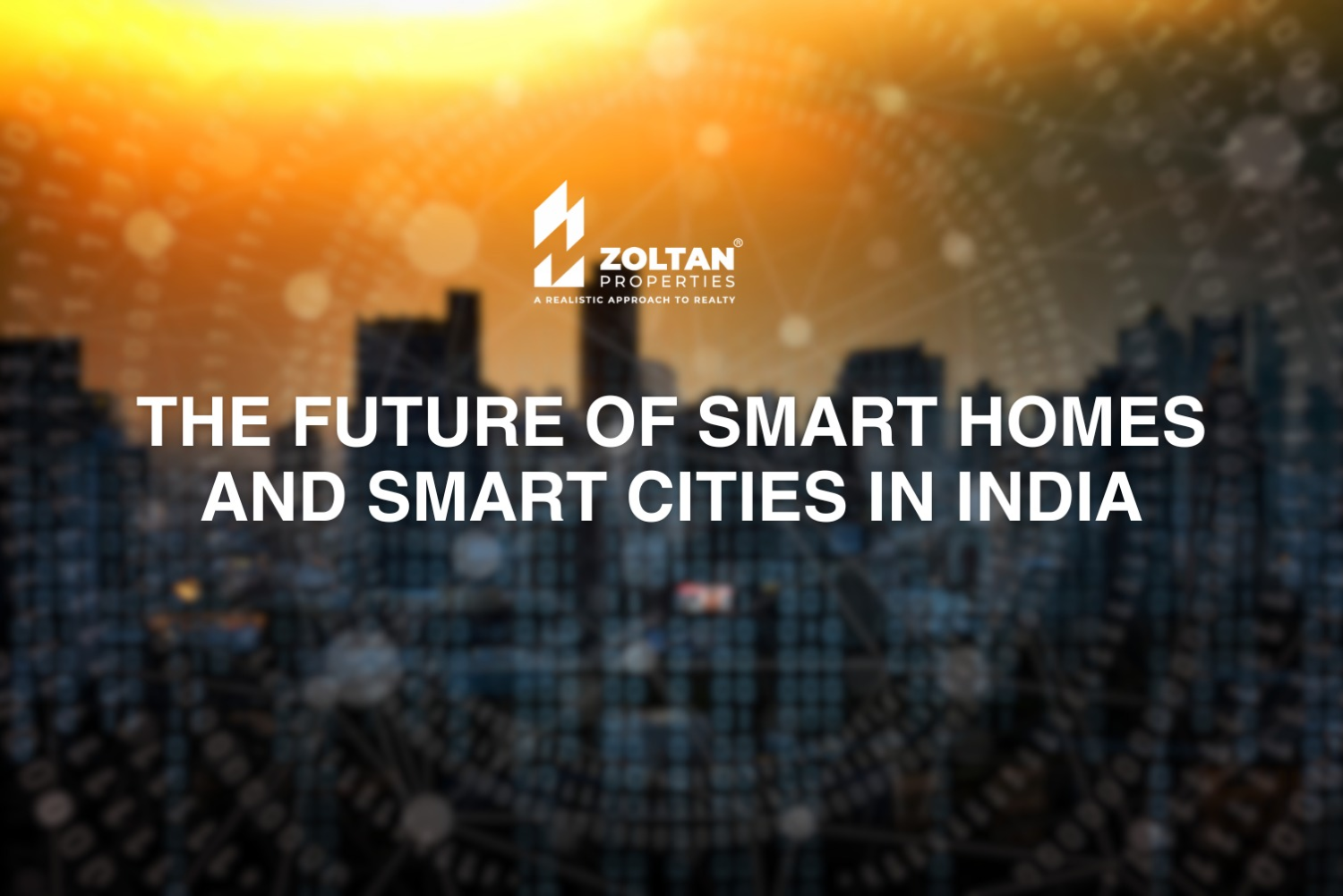It’s about to be a decade now since PM Shri Narendra Modi announced the 100 smart cities mission on 25 June 2015.
With this, India embarked on a transformative journey towards creating smart homes and smart cities. As technology continues to evolve at an unprecedented pace, the integration of smart technologies holds immense promise for improving the quality of life, fostering sustainability, and addressing pressing urban challenges. This blog explores the multifaceted landscape of smart homes and smart cities in India, delving into their potential to revolutionize the way we live, work, and interact with our surroundings.
Smart city and smart home - Definition
Smart City
The Smart Cities Mission Statement & Guidelines report by the Ministry of Urban Development, Government of India defines a Smart City as a city that “provide core infrastructure and give a decent quality of life to its citizens, a clean and sustainable environment and application of ‘Smart’ Solutions.”

The “urban planners ideally aim at developing the entire urban ecosystem, which is represented by the four pillars of comprehensive development — institutional, physical, social, and economic infrastructure.” says the report.
The report also states that the “purpose of the Smart Cities Mission is to drive economic growth and improve the quality of life of people by enabling local area development and harnessing technology, especially technology that leads to Smart outcomes.”
Smart Home
Smart homes, on the other hand, refer to residential spaces equipped with advanced technologies and interconnected systems that enable automation, control, and optimization of various home functions. These functions can include lighting, heating and cooling, security systems, entertainment systems, and appliances. Smart homes leverage IoT devices, sensors, and intelligent algorithms to provide enhanced convenience, energy efficiency, security, and comfort to residents. They can be controlled and monitored remotely using smartphones or voice commands, allowing homeowners to manage their homes from anywhere.
How smart homes and smart cities can improve the quality of life and sustainability in India?
By leveraging the power of connectivity, automation, and data-driven insights, smart homes, and smart cities have the potential to uplift the quality of life for individuals and communities across India. From enhanced convenience and security to optimized resource management and energy efficiency, these technologies offer a range of benefits that can streamline daily routines, reduce environmental impact, and foster sustainable practices.
Enhanced Comfort and Convenience
Smart homes offer seamless automation and control over various aspects of daily life. Residents can remotely manage lighting, temperature, security systems, and appliances, creating a personalized and comfortable living environment. This automation reduces the time and effort required for routine tasks, freeing up valuable time for individuals to focus on other activities.
Efficient Resource Management
Smart homes enable efficient management of resources, such as energy and water. By integrating smart meters, sensors, and energy management systems, homeowners can monitor and optimize their energy consumption. This leads to cost savings, reduced carbon footprint, and a more sustainable use of resources.
Improved Safety and Security
Smart home technologies enhance security measures, making homes safer for occupants. Features like smart locks, surveillance cameras, and motion sensors provide real-time monitoring and alerts, deterring potential intruders and ensuring the safety of residents. Additionally, smart smoke detectors and water leak sensors can detect emergencies and notify homeowners promptly, minimizing damage and increasing overall safety.
Sustainable Infrastructure and Urban Planning
Smart cities incorporate advanced technologies to improve urban infrastructure and planning. By integrating IoT devices, data analytics, and real-time monitoring systems, cities can optimize energy distribution, manage waste effectively, and enhance transportation networks. This results in reduced energy consumption, decreased traffic congestion, improved waste management, and a healthier urban environment.
Accessible and Inclusive Communities
Smart homes and smart cities have the potential to create more inclusive communities by leveraging technology. IoT-enabled assistive devices can enhance accessibility for people with disabilities, enabling them to navigate their homes and the city more easily. Smart transportation systems, with features like real-time updates and route planning, can cater to diverse mobility needs, ensuring that everyone can move around the city conveniently.
Community Engagement and Participation
Smart cities foster citizen engagement and participation through digital platforms and applications. Residents can provide feedback, report issues, and actively contribute to urban decision-making processes. This inclusive approach empowers individuals to have a say in shaping their communities, leading to a stronger sense of belonging and collective responsibility.
By leveraging smart technologies, India can improve the quality of life for its citizens while ensuring a sustainable future. However, it is important to address challenges such as affordability, digital literacy, and privacy concerns to ensure equitable access and widespread adoption of these technologies.
The challenges and opportunities of implementing smart technologies in India’s urban and rural areas
While the potential of smart technologies is vast, their implementation in India's diverse urban and rural areas present a unique set of challenges and opportunities. Factors such as infrastructure gaps, digital literacy, and socio-economic disparities need to be addressed to ensure inclusive and equitable access to smart solutions. However, the immense population and growing digital adoption present a fertile ground for innovative solutions, bridging the gap between urban and rural areas and propelling India towards a digitally empowered future.
Challenges
Infrastructure
Inadequate infrastructure, especially in rural areas, poses a significant challenge to the implementation of smart technologies. Limited access to reliable electricity, internet connectivity, and communication networks hinders the deployment and functioning of smart devices and systems.
Affordability and Accessibility
The cost of smart technologies and devices can be a barrier to widespread adoption, particularly in lower-income communities. Ensuring affordability and accessibility of smart solutions is crucial to prevent the creation of a digital divide and to promote inclusivity.
Digital Literacy
A lack of digital literacy and technological skills among a significant portion of the population poses a challenge to the effective use and maintenance of smart technologies. Education and awareness programs are necessary to empower individuals and communities to leverage the benefits of smart technologies.
Interoperability and Standardization
The integration of various smart devices and systems requires interoperability and standardization of protocols and interfaces. Ensuring compatibility and seamless communication between different technologies and platforms can be a complex task, particularly when dealing with diverse vendors and stakeholders.
Privacy and Data Security
The extensive collection and analysis of data in smart technologies raise concerns about privacy and data security. Safeguarding personal information, ensuring secure data transmission, and establishing robust cybersecurity measures are crucial to maintain public trust and protect individual privacy.
Opportunities
Digital Connectivity
India's increasing digital connectivity provides a solid foundation for the implementation of smart technologies. The widespread use of mobile phones and the growing internet penetration enable the integration of smart devices and services, even in remote areas.
Sustainable Development
Smart technologies offer opportunities for sustainable development by optimizing resource utilization and reducing environmental impact. Efficient energy management, waste management, and transportation systems can contribute to a greener and more sustainable future.
Economic Growth and Job Creation
The deployment of smart technologies can stimulate economic growth and job creation. It opens up avenues for innovation, entrepreneurship, and the development of new industries related to smart infrastructure, IoT solutions, and digital services.
Customization for Rural Needs
Smart technologies can be customized to address the specific needs of rural areas. Agriculture, healthcare, and education are sectors that can benefit from tailored smart solutions, improving productivity, access to services, and quality of life in rural communities.
Public-Private Collaboration
The implementation of smart technologies requires collaboration between the public and private sectors. This collaboration can lead to innovative partnerships, investment opportunities, and knowledge sharing, driving the development and deployment of smart solutions across urban and rural areas.
Addressing the challenges and leveraging the opportunities presented by smart technologies in India's urban and rural areas requires a multi-stakeholder approach. Government initiatives, private sector involvement, community engagement, and partnerships can collectively drive the adoption and implementation of smart technologies while ensuring inclusivity and sustainable development.
The current state and future trends of smart home and smart city projects in India
India's journey towards smart homes and smart cities have gained significant momentum in recent years. From the development of smart cities like Kochi and Jaipur to the proliferation of IoT-enabled devices in households, the country is witnessing a rapid adoption of smart technologies.
The current state of smart home and smart city projects in India showcases a growing momentum toward digital transformation and urban development. Here is an overview of the current state and future trends:
Current State
Smart Cities
The Indian government's Smart Cities Mission launched in 2015 has led to the development of numerous smart city projects across the country. Cities like Pune, Jaipur, and Bhubaneswar have made significant progress in implementing smart technologies, including intelligent transportation systems, smart waste management, and energy-efficient infrastructure.
Smart Homes
The adoption of smart home technologies is gaining traction in India. Home automation systems, voice-controlled devices, and energy management solutions are becoming increasingly popular. IoT-enabled devices such as smart lighting, thermostats, and security systems are being integrated into homes, enhancing convenience, energy efficiency, and security.
Digital Infrastructure
India has witnessed remarkable growth in digital infrastructure, with expanding internet penetration, 4G and 5G networks, and mobile connectivity. These advancements lay the foundation for the integration of smart technologies and the Internet of Things (IoT) into homes and cities.
Future Trends
Internet of Things (IoT)
IoT will play a pivotal role in the future of smart homes and smart cities in India. The proliferation of connected devices and sensors will enable seamless data exchange, automation, and optimization of various services, leading to increased efficiency, improved resource management, and enhanced quality of life.
Artificial Intelligence (AI) and Machine Learning (ML)
AI and ML technologies will drive advancements in smart homes and smart cities. AI-powered virtual assistants, predictive analytics, and autonomous systems will contribute to personalized experiences, efficient energy management, and intelligent decision-making in urban planning and governance.
Renewable Energy Integration
The integration of renewable energy sources, such as solar power, into smart homes and smart cities will gain prominence. Smart grids, energy storage solutions, and intelligent energy management systems will facilitate the efficient utilization of renewable energy and help in achieving sustainability goals.
Mobility and Transportation
Future smart city projects will focus on developing intelligent transportation systems, including electric vehicles (EVs), smart parking, and intelligent traffic management. The emphasis will be on reducing congestion, enhancing public transportation, and promoting sustainable mobility options.
Data Analytics and Predictive Insights
The abundance of data generated by smart devices and systems will be leveraged to gain valuable insights for better decision-making. Data analytics, predictive modeling, and real-time monitoring will enable proactive urban planning, resource optimization, and effective governance.
Citizen Engagement and Co-creation
The future of smart homes and smart cities will prioritize citizen engagement and co-creation. Participatory platforms, mobile applications, and community involvement will empower citizens to actively contribute to urban development, provide feedback, and shape the direction of smart city initiatives.
Conclusion
The future of smart homes and smart cities in India holds immense promise for transforming the way we live and interact with our surroundings. By harnessing the power of technology, India can unlock new avenues for improving the quality of life, promoting sustainability, and fostering inclusive growth. As we navigate this transformative journey, it is essential to navigate the challenges, seize the opportunities, and work towards creating a future that is smart, sustainable, and equitable for all.
The dream of smart cities is still very far, but you can fulfill your dream of living in a smart home. Zoltan Properties brings you properties for sale in India & abroad that are equipped with state-of-the-art technology and built keeping luxury, comfort & aesthetics in mind.
Live your dream of living in a smart home with Zoltan Properties. Visit www.zoltanproperties.com to book an appointment with our consultants & advisors.

 IN
IN
 France
France
 Germany
Germany
 Greece
Greece
 India
India
 Saudi Arabia
Saudi Arabia
 Spain
Spain
 United Arab Emirates
United Arab Emirates
 United Kingdom
United Kingdom
 United States
United States






